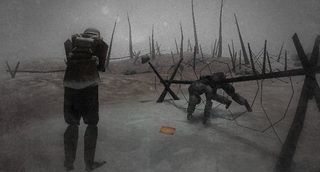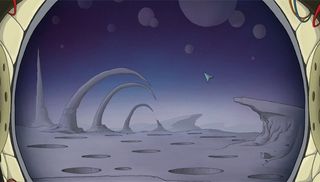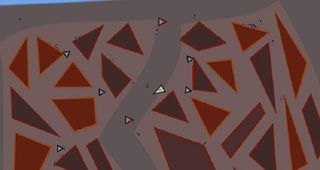Free PC games are awesome, thanks for reading about them

Writing a regular column about free games has been one of the most transformative jobs I've ever taken. Buried away in the depths of the internet are some remarkable things, and being able to unearth them, then share them with a huge number of like-minded people, is always an absolute pleasure.
It's also changed the way I think about games, changed the way I write about games, and even inspired me to make games. All this from spending one day a week playing mostly amateur creations then scrawling down some words about what I made of them.
I've played some fantastic games while preparing these columns. Nous , a fascinatingly dark abstract shooter that poses as a personality-evaluating AI, was one of the more intriguing ones. It's a game that spins an unnerving story through its only character, who flits worryingly between help and harm. It's immaculately presented, and alternately amusing and sinister. A real gem.

Or how about Wonderputt ? It's a crazy golf game among the most delightful freebies I've ever seen. It presents an ever-changing landscape, a world that morphs around you as you progress through its 18 holes, and one of the most fabulously animated things. It only lasts about 15 minutes, but I spent that time with my face fixed into a grin.
For absolutely no pennies, you can experience things unlike anything else in our medium. Take Terry Cavanagh's At a Distance , a co-op game that asks two players to sit on a local network, exploring an abstract maze, making changes to each other's versions of the world as they work to solve its ultimate puzzle. Haunting and abstract, it's a fascinating look at how we can work together within games in new and exciting ways.
The Snowfield , too, is an experimental game. In it, you explore a harrowing wartorn environment, a place where the snow continues to fall and haunting sounds emit from its farer reaches. Soldiers who are still standing walk among the dead bodies, crying. It's not polished, but it's utterly affecting.

And, more recently, Unmanned 's split-screen dialogue-choosing and mundane-task-completion contrasted stunningly with the more hard-hitting elements of its storyline. Its central character is often unpleasant - a liar and a cheat and a racist, if you let him be - but the questions it asks you as a player go far beyond those that are a part of the game itself.
PC Gamer Newsletter
Sign up to get the best content of the week, and great gaming deals, as picked by the editors.
Then there's been the bigger games. Portal was free for a while ( it's currently just £7 ). World of Warcraft got a stripped-back free-to-play version. Team Fortress 2 went almost entirely free as it continued to expand, and Bungie's Marathon trilogy turned up without charge. That even the major studios occasionally give us something for nothing is a lovely thing: it might often be a smart business decision, advertising other titles or enticing in new players, but it still presents us with opportunities to try out some truly special releases without stretching our wallets.
Perhaps most importantly to me, I've spent time delving into the Adventure Game Studio community. AGS is a free-to-use game engine that's powered a number of commercial games, such as Time Gentlemen, Please! and Gemini Rue, but it's also the tech behind a huge number of free releases created as projects of passion. Being astonished by the quality of Keys of a Gamespace , Egress and Donna: Avenger of Blood inspired me to make my own game - Masked - in AGS. And I'm currently working on an even bigger project that utilises it.

I've revisited older games and I continue to find new ones. Spelunky is still, I genuinely believe, one of the best games available on PC - a free roguelike platformer with an stupidly ruleset and a fascinating environment to explore and destroy. Digital: A Love Story is an indie adventure set in the late 1980s, and sees your teenage character embark on a touching journey of discovery. And the terrifying but brilliant Dwarf Fortress recently got an enormous update.
This week, Flatland: Fallen Angle turned up with the best name in the world and a minimalist, noir-esque vibe. It's a game in which you play as a triangle on the run in a two-dimensional city. (Its 'Appreciation Version', which functions on a pay-what-you-like model, recently fell foul of PayMate - who cancelled and refunded all orders without notice, deciding only to inform the developers afterwards that they don't work with games because 'teenagers steal their parents' credit cards to buy them'.) Meanwhile, Russian Subway Dogs sees your canine character scurrying around the underground picking up scraps of food, fighting with other dogs, and - most importantly, of course - exploding bottles of vodka.
This is my last free games column for PC Gamer, but those fantastic free games won't stop coming, and I'm sure PC Gamer will continue to write about them.

Recently, I interviewed some developers as part of a feature I was writing. I wanted to find out why, when they are clearly such talented designers, artists and programmers, they persist in giving away their creations and asking for no money in return. Some of them worked full-time in the games industry and made their freebies on the side. For others, it was just a hobby. But one thread ran through every one of their answers: games are awesome, we love making them, and we want as many people as possible to benefit from that.
In what can often be a cynical industry, these developers are quite remarkable people. Long may their fabulous work continue.
Thanks for reading, folks.
Most Popular

